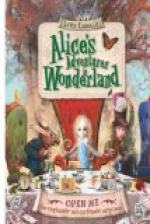|
|
Alice in Wonderland Topic Tracking: Meaning
Meaning 1: Though Alice realizes that she is in a land where nothing seems normal and nothing seems impossible, she is surprised and disconcerted when she finds herself speaking nonsense. In this bit of nonsense, she tries to figure out how to send packages to her feet, considering she's grown so tall she can scarcely see them.
Meaning 2: The Mouse tries to tell a very boring yet important story about William the Conqueror, but the rest of the creatures have a hard time following it. There is a bit of a dispute over the meaning of the word "it." Then one of the birds complains that the Mouse is telling a story full of words that his audience cannot understand--he also accuses the Mouse of not knowing the meaning of many of the words he uses. It turns out that this story, whose meaning is difficult to comprehend, has very little effect on any of the listeners.
Meaning 3: Alice's Adventures in Wonderland is full of humorous nonsense verses, most of which are parodies of popular poems from Carroll's time. One of the best known nonsense poems in the book is the one Alice recites to the Caterpillar: "You are old, Father William." This poem is a parody of one called "The Old Man's Comforts and How He Gained Them," a poem full of lessons and meaning.
Meaning 4: The Mad Hatter, confused by Alice's speech, tells her to say what she means. He demonstrates an important distinction between statements with apparently identical meanings when he tells Alice that "I say what I mean" does not mean the same thing as "I mean what I say." He reminds Alice that she wouldn't assume that "I eat what I see" means the same thing as "I see what I eat."
Meaning 5: Now alert to shades of meaning, Alice tries to understand the Hatter, but he doesn't seem to speak with much logic or sense. Although she understands the meanings of each individual word he uses, Alice is often unable to find meaning in a statement as a whole.
Meaning 6: The Duchess, who constantly moralizes everything, tells Alice to "Take care of the sense, and the sounds will take care of themselves." That is, she advises Alice to worry about the meanings of speech or writing first and foremost--according to her, if the meanings are right, then the proper form will follow as a matter of course. This moral is actually a play on the English proverb "Take care of the pence and the pounds will take care of themselves." Carroll often uses wordplay--especially puns--to expand or shift the meanings of expressions.
Meaning 7: The Mock Turtle and the Gryphon are both punsters, and several times Alice finds their puns confusing. She believes, for example, that the Mock Turtle means "purpose" and not "porpoise" when he speaks of the importance of traveling with a porpoise. Insulted by Alice's suggestion, the Mock Turtle assures her that he means what he says.
Meaning 8: When Alice tries to recite a poem and it comes out all wrong, the Mock Turtle gets quite frustrated because he can't understand it. He thinks what Alice has recited is utter nonsense, and the Gryphon comments that there is no way Alice would be able to explain the meaning of what she has said. The Mock Turtle exclaims that there's no point in Alice reciting her lessons if she can't explain what she recites.
Meaning 9: Much at the trial is so ridiculous that it doesn't have much meaning. Alice doesn't think it to be of much significance whether the jurors are heads up or tails up in the jury box. The King of Hearts seems to be unable to tell the difference between words opposite in meaning such as "important" and "unimportant".
Meaning 10: When the letter is presented as evidence at the trial, the King goes to great lengths to analyze and explain the nonsensical verses; in addition, he finds the letter to be a most important and revealing piece of evidence. Alice, however, announces that she doesn't believe there is an atom of meaning in the verses, and she challenges all present at the trial to explain their meaning.




